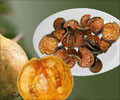According to an expert, regular intake of chocolate, fruits, vegetables, red wine and tea could help protect against Alzheimer's disease.
According to an expert, regular intake of chocolate, fruits, vegetables, red wine and tea could help protect against Alzheimer’s disease.
Dr. Robert Williams, a biochemist at Kings College London, says that all contain chemicals called flavonoids that may also help existing dementia sufferers.Flavonoids are naturally occurring antioxidants, which help beat cancer and the aging process by protecting cells from damage. They also mop up potentially harmful oxygen molecules in the body.
New research is emerging that suggests flavonoids do not act only as antioxidants but exert their effects in other ways.
"There have been some intriguing epidemiological studies that show the consumption of flavonoid-rich vegetables, fruit juices and red wine delays the onset of the disease," the Daily Express quoted Williams as saying.
Williams and his colleagues have focused their own cellular studies on a flavonoid called epicatechin, found in many foodstuffs, including cocoa.
"We have found that epicatechin protects brain cells from damage but through a mechanism unrelated to its antioxidant activity and have shown in laboratory tests that it can also reduce some aspects of Alzheimer’s disease pathology," he said.
Williams has shown that flavonoids can protect brain cells against the toxic actions of beta-amyloid.
Williams will present his findings at the British Pharmacological Society’s Summer Meeting in Edinburgh.
Source-ANI
ARU
 MEDINDIA
MEDINDIA



 Email
Email










